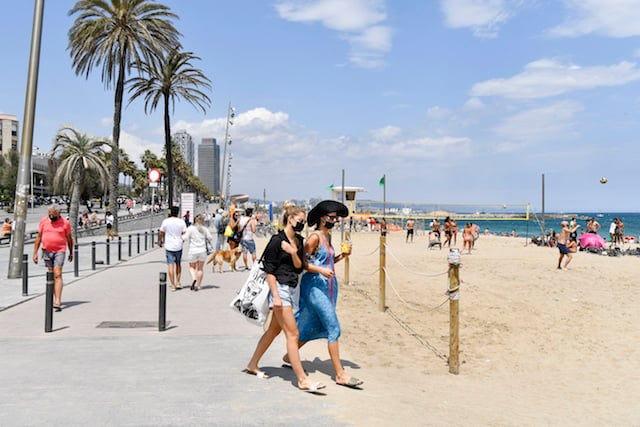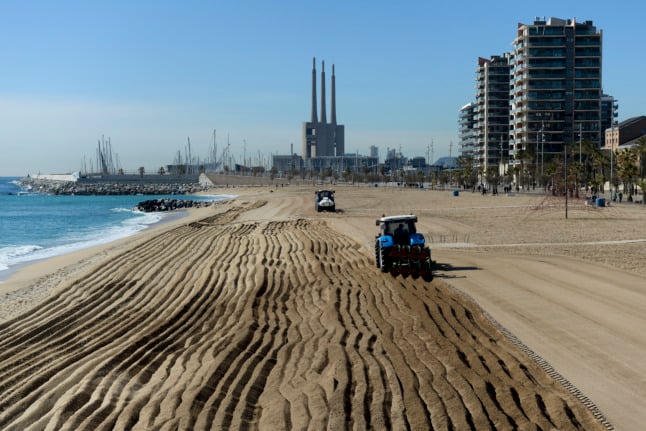“The time for dialogue has arrived,” Puigdemont told reporters outside the Neumuenster prison, after he walked free on a €75,000 ($92,000-) bail while judges mull whether to extradite him on a lesser charge of corruption.
“We have demanded dialogue for several years and we have only received violence and repression,” Puigdemont said.
“There is no excuse for the Spanish authorities to start a political dialogue with the Catalan political leaders.”
“The time for dialogue has arrived.” #Puigdemont is out, demands negotiations with Spain. pic.twitter.com/zOXiW6wvmU
— Steffen Lüdke (@stluedke) April 6, 2018
The 55-year-old also called for “the immediate release of all of my (Catalan) colleagues”, who consider themselves political prisoners in the spat with Madrid over the wealthy northeastern region's failed breakaway bid.
In a major victory for Puigdemont, the upper state court in Schleswig-Holstein on Thursday dismissed Spain's request to extradite Puigdemont on a rebellion charge over last October's independence referendum, deemed illegal by Madrid.
The judges ruled that the charge was “inadmissable” because rebellion — which carries a maximum sentence of 30 years in Spain — was not punishable under German law.
The closest German equivalent, the criminal offence of high treason, did not apply because Puigdemont's actions were not accompanied by violence, the judges found, exposing a difference in opinion with Spanish judges.
But they said the former Catalan president could still be sent to Spain to face trial for the misuse of public funds to organise the disputed referendum.
The German judges said they needed to gather more information before making a decision on the embezzlement charge, but ruled that Puigdemont could be released in the meantime.
Madrid has estimated the cost of staging the referendum at €1.6 million.
If convicted, Puigdemont could face up to eight years in jail. As part of his bail conditions, Puigdemont must remain in Germany, report to police weekly and respond to summons from prosecutors or the court.
Blow to Madrid
German police detained Puigdemont on March 25 as he was travelling from Finland back to Belgium, where he has been living in self-imposed exile for the past six months.
The arrest came two days after Spain's Supreme Court ordered international warrants for Puigdemont and other fugitive Catalan leaders on charges linked to holding the banned referendum.
The German court's refusal to accept the rebellion charge is a blow to Madrid, as under European law it means Puigdemont cannot be prosecuted for the offence even if he is returned to Spain.
Despite the setback, the Spanish government said it “respected” the German judges' decision.
Berlin, which has long expressed support for Madrid's actions in the Catalan row, declined to comment on the latest judicial developments.
“The process lies in the hands of the justice system, as is right,” said German government spokeswoman Ulrike Demmer.
“The government remains convinced the Catalan conflict has to be resolved within the Spanish legal and constitutional order,” she added.
Flights to Europe
Catalonia has been mired in political crisis ever since the unilaterally declared independence on October 27th in the wake of the controversial referendum.
Prime Minister Mariano Rajoy's conservative government responded by sacking the Catalan government, taking direct control of the region and calling early elections.
The December vote was won by a block of separatist parties. But they have been unable to elect a president and form a government as their chosen candidates are now either in exile, in jail or facing prosecution.
Fresh regional elections will be triggered if a new leader is not elected by May 22nd.
Puigdemont was one of a number of Catalan figureheads who fled abroad to escape prosecution, dragging other European countries into the row.
A Belgian judge on Thursday bailed three former Catalan ministers who fled to Belgium with Puigdemont after they handed themselves in to police there.
Spain wants the trio — Meritxell Serret, Antoni Comin, Lluis Puig — to face charges of rebellion, misuse of public funds and disobeying the state.
Another former Catalan minister, Clara Ponsati, was bailed in Scotland last week.
Nine other pro-independence figures are currently in custody in Spain, including six members of Puigdemont's Catalan government and the former president of the regional parliament.
A major demonstration calling for imprisoned separatist leaders to be freed is planned for April 15th in Barcelona.





 Please whitelist us to continue reading.
Please whitelist us to continue reading.